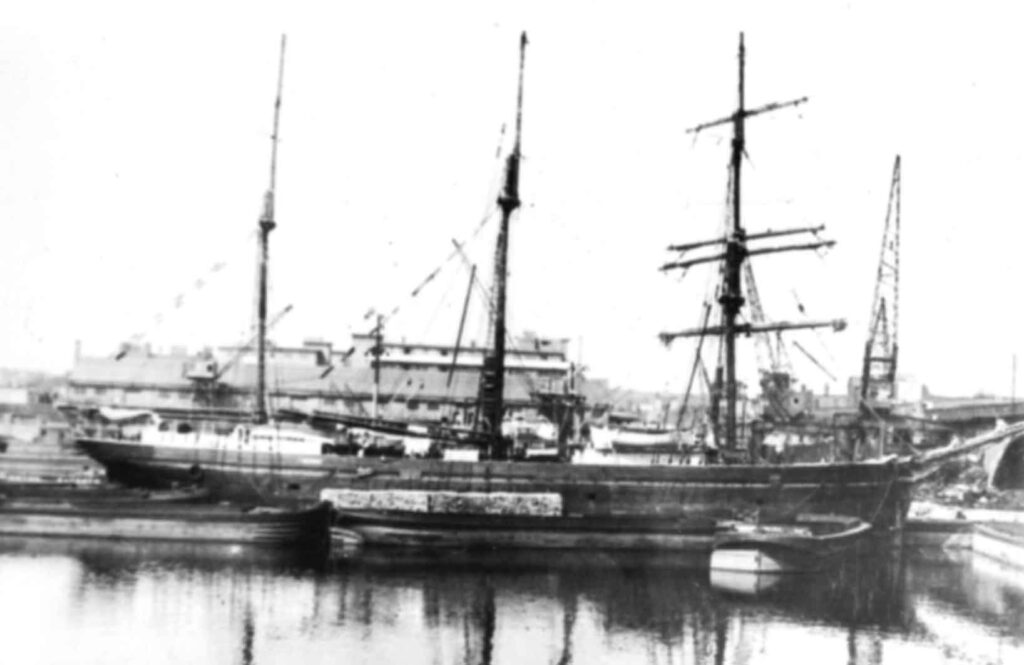Month: August 2022
Staying Power
The Friedeburg dropped anchor about two miles outside Lyttelton harbour 150 years ago today—30 August 2022. It was a Friday afternoon, and the “fine iron ship” had spent 102 days at sea.
It remained anonymous until the next day, prompting the Christchurch Star that Monday to lobby for “the urgent necessity that exists for the establishment of telegraphic communication” between the lighthouse at the north Godley Head that screened the ship from the port that afternoon, the signal station on Adderly Head on the south side of the harbour entrance, and the Lyttelton telegraph office.
No doubt that after so long at sea, Captain Kopper and his crew were relieved to be under the cliff’s shelter, and had no idea of the fuss they created by not making themselves known immediately.

Christchurch immigration officials had been processing scores of ships and their passengers since the Charlotte Jane and the Randolph arrived on 16 December 1850, but the Friedeburg was another first. She arrived from Hamburg in continental Europe rather than from London. Her 292 passengers represented what immigration authorities called 241 statute adults. Immigration agents charged with finding suitable labourers for the new colony were paid £1 for every person older than 12 who arrived in New Zealand. Children younger than 12 were classified as half a statute adult, and babies younger than a year became simply “souls.”
The Friedeburg carried more than 90 Poles, more than 80 Germans, nearly 60 Norwegians and the same number of Danes. The next morning, three immigration officers and two interpreters arrived in Lyttelton to be taken to the vessel by the barque Gazelle. The flag flying on its stern confirmed the ship’s identity, and the men stepped into a crowd of different languages.
Like on other immigrant ships, the living quarters of married couples and families aboard Friedeburg divided those of the single men and single women. It is not clear whether authorities in Hamburg also divided the nationalities, or whether they did it themselves, but reports from the passengers about the voyage show that the Germans and Poles “on one side of the ship” seemed to have a poorer quality experience than the Danes and the Norwegians on the other side. The latter were wealthier and had been able to bring more “comforts” with them, as well as having money to be able to supplement the ordinary ship’s rations.
The 102 days aboard the Friedeburg ended with a flurry of attention for the single women and men, much sought-after by farmers wanting domestic workers and labourers. Despite language barriers, they seemed to have no trouble finding work. The larger families, which had provided a good income for the immigration agents, were not as lucky.
The Poles seemed to move as a loose unit to the Banks Peninsula. The Kotlowski family were the only ones who stayed there—apparently Marianna Kotlowska refused to move again. The rest made their way north and settled in northern Christchurch. As more large groups of Poles arrived in the colony in the next few years, Friedeburg families such as Burkett, Groszinski, Kurek, and Wisniewski migrated north to join other Polish settlements such as Inglewood in Taranaki. Jan Gierszewski’s family moved to the USA, but his brother Michał Gierszewski, who arrived off the Humboldt in 1873, remained in Marshland.
The Friedeburg Poles made names for themselves as market gardeners in Marshland and farmers in Taranaki, and Polish names show up on any walk among the headstones of old cemeteries such as the Linwood in Christchurch, or the Inglewood in Taranaki.
I am still looking for several of the single women, like Wilhelmina Arczikowska, Julianna Borcinska, and Paulina Woszewiak, off the Friedeburg. They are among the Polish women who disappeared thanks to mutilated spellings in marriages. Two Friedeburg families also remain elusive: Jablonski and Szutkowski, but sometimes there are gems: On a headstone at the Linwood cemetery are the words: “Matthew Shaskey (Mathias Jaroszewski) born Poland 22-2-1835. Died Christchurch 26-10-1912. Loved husband of Anna. Interred at Gisborne. RIP” Matthew and Anna’s son John remained in Christchurch, became a market gardener, kept the Shaskey name, and is buried at the Waimairi cemetery.
Other Friedeburg names at the Linwood cemetery are Borlowski, Burysek, Grofski (Grochowski), Gurni, Piekarski, Szymanski, Watembach, and Dunick (Zdunek). Most lived and farmed in Marshland and its environs.
Their descendants can be rightly proud of their contributions to a developing new colony. It has been a privilege to research and write about their families, and others who showed Polish grit and hospitality long before it was recognised.
—Barbara Scrivens
31 August 2022
_______________
Put “Friedeburg” into the search function at Papers Past to see a variety of stories about the ship and the settlers. The newspaper article here came from https://paperspast.natlib.govt.nz/newspapers/TS18720902.2.9
Go to the Early Settlers section, and follow some of the stories in the menu.
https://polishhistorynewzealand.org/early-settlers/
Marshland, The Place Where Flax Grows Profusely is available at:
https://polishhistorynewzealand.org/marshland/
If you would like to comment on this post, or any other story, please email editor@polishhistorynewzealand.org/
